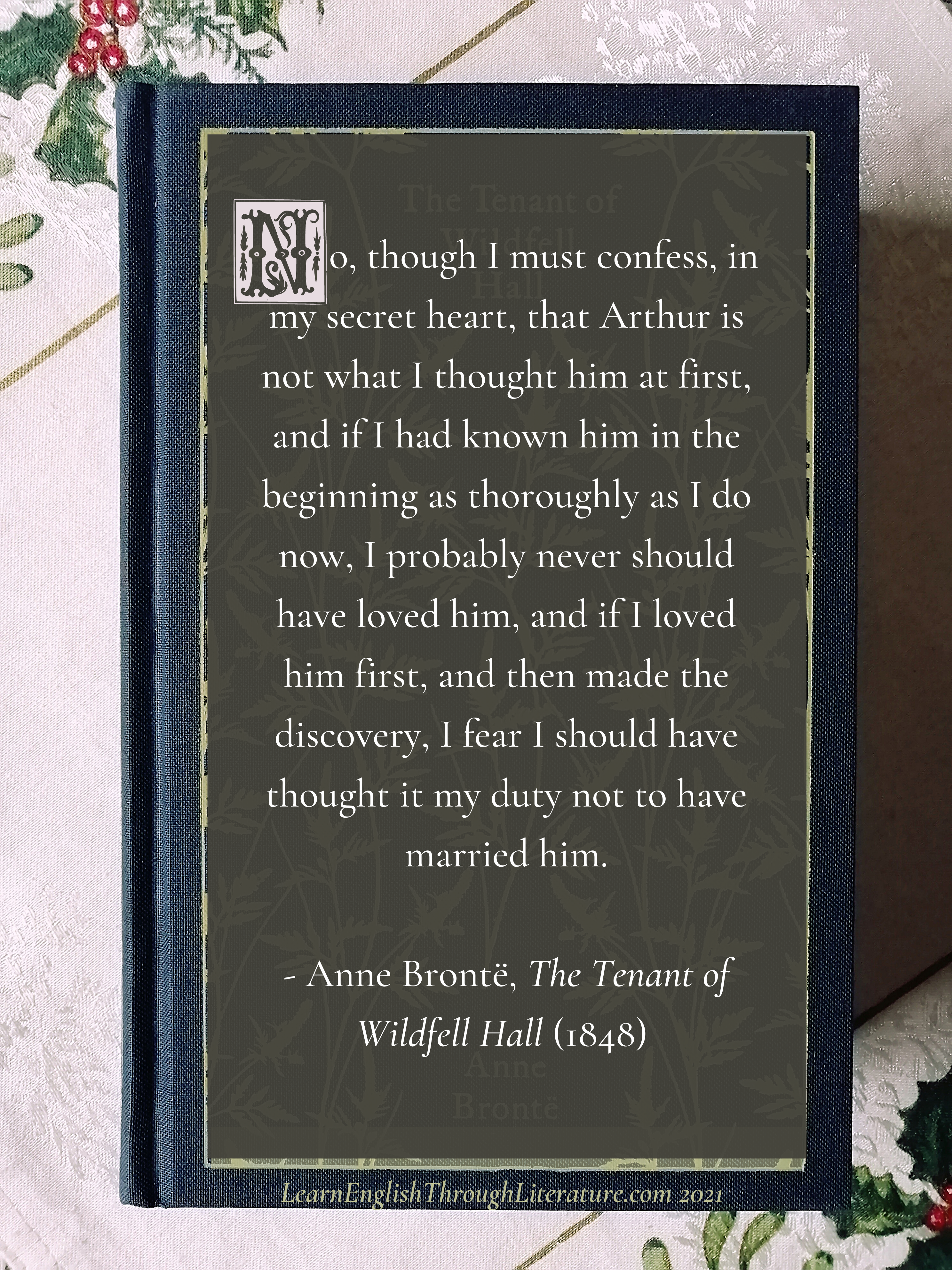📗 ‘I probably never should have loved him, and if I loved him first, and then made the discovery, I fear I should have thought it my duty not to have married him.’
– Anne Bronte, The Tenant of Wildfell Hall
We will continue our Lesson on ‘modal verb forms that express obligation’ here. We have already looked at the meanings and uses of the ‘strong obligation’ words ‘must’ and ‘have to’ / ‘have got to’ in Part 1 of the Lesson. Here in Part 2 we look at everything to do with the ‘weaker obligation’ expressions ‘should’ and ‘ought to’, with the help of Anne Bronte’s seminal classic, The Tenant of Wildfell Hall (1848).
…
📝 ‘SHOULD’ AND ‘OUGHT TO’
✍️ ‘Should’ and ‘ought to’ – these are modal verb expressions of weak obligations. You can think of them as expressing advice or expectation rather than strong obligation (like ‘must’ or ‘have to’).
…
📝 ‘SHOULD’
✍️ ‘Should’ expresses advice, suggestion, expectation, or recommendation. The person who ‘should’ do something has a choice. It can also be used to express an opinion in the present about something that happened in the past (especially someone’s action or past behaviour).
📗 “But heaven help me! I am not going to sell my child for gold, though it were to save both him and me from starving: it would be better that he should die with me than that he should live with his father.”
– Anne Bronte, The Tenant of Wildfell Hall (emphasis mine)
..
📝 ‘OUGHT TO’
✍️ ‘Ought to’ emphasises duty, necessity, regret, likelihood (probability), or moral obligation. (Ought to is hardly ever used now in questions and negatives).
📗 ‘“You ought to forgive him, Mr. Hargrave, since he asks you,” said I.’
– Anne Bronte, The Tenant of Wildfell Hall (emphasis mine)
Note: ‘ought to’ is considered to be semi-modal because it always uses the ‘to’ of the following verb’s infinitive: ‘ought to eat’, ‘ought to help’, ‘ought to support’, etc. This is unlike all other modal verb forms which do not use the ‘to’ of the following verb’s infinitive form.
..
📝 ‘SHOULD’ AND ‘OUGHT TO’ COMPARED:
✍️ ‘Should’ tends to express personal or subjective opinions, whereas ‘ought to’ expresses more objective opinions that are based on moral laws or general obligation. ✍️
📗 “You should have told me this before. It shows a want of confidence—”
– Anne Bronte, The Tenant of Wildfell Hall
📗 “Well, we ought to be charitable, you know, aunt—”
– Anne Bronte, The Tenant of Wildfell Hall
..
📝 TENSES
✍️ The past of ‘should’ is ‘should have [past participle].’ The future of ‘should’ is simply ‘should’ or ‘should [do] …’
📗 ‘I probably never should have loved him, and if I loved him first, and then made the discovery, I fear I should have thought it my duty not to have married him.’
– Anne Bronte, The Tenant of Wildfell Hall (emphasis mine)
📗 “‘And sweetness and goodness enough,’ he continued, ‘to make home tolerable, and to reconcile me to myself, I think I should do yet.”
– Anne Bronte, The Tenant of Wildfell Hall (emphasis mine)
✍️ The past of ‘ought to’ is ‘ought to have [past participle]’. The future of ‘ought to’ is the same: ‘ought to’ or ‘ought to do …’
📗 “It is a resolution you ought to have formed long ago.”
– Anne Bronte, The Tenant of Wildfell Hall (emphasis mine)
📗 ‘She laid the rose across my palm, but I scarcely closed my fingers upon it, so deeply was I absorbed in thinking what might be the meaning of her words, and what I ought to do or say upon the occasion; whether to give way to my feelings or restrain them still.’
– Anne Bronte, The Tenant of Wildfell Hall (emphasis mine)
..
📝 NEGATIVES OF ‘SHOULD’ AND ‘OUGHT TO’:
✍️ ‘Should not/ shouldn’t’ in the negative is the only form of the four expressions that can be used to give negative advice.
‘You shouldn’t leave (for the airport) too late – you might end up missing your flight!’
While ‘should not’ can be abbreviated to ‘shouldn’t’, there is no abbreviation for ‘ought not to’ – it remains the same.
..
📝 SUMMARY OF ALL FOUR FORMS: ‘MUST’, ‘HAVE TO’/’HAVE GOT TO’, ‘SHOULD’, AND ‘OUGHT TO’.
✏️ ‘MUST’:
- It can be informal or informal, depending on its emphasis
- It expresses the strongest obligation of all these words
- It often describes legal obligation
✏️ ‘HAVE TO’ / ‘HAVE GOT TO’:
- It is informal
- It expresses very strong obligation
- It usually expresses general law or obligation
✏️ ‘SHOULD’:
- It is informal in tone most of the time
- It expresses weak obligation – advice, suggestion, or expectation
- It is used to express general (subjective) obligation
✏️ ‘OUGHT TO’:
- It is formal
- It expresses strong obligation – duty, necessity, morality
- It usually expresses moral (objective) obligation
…
Hopefully this has clarified the differences between ‘must’, ‘have to’ / ‘have got to’, ‘should’, and ‘ought to’ for you!
I have tried to cover everything of importance in relation to ‘must’, ‘have to’/‘have got to’, ‘should’, and ‘must’. Of course, if you have further questions or just need a lesson or two to practice the above points, feel free to contact me and I will be happy to help you as soon as possible. 😊




